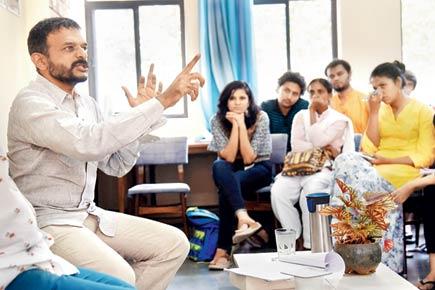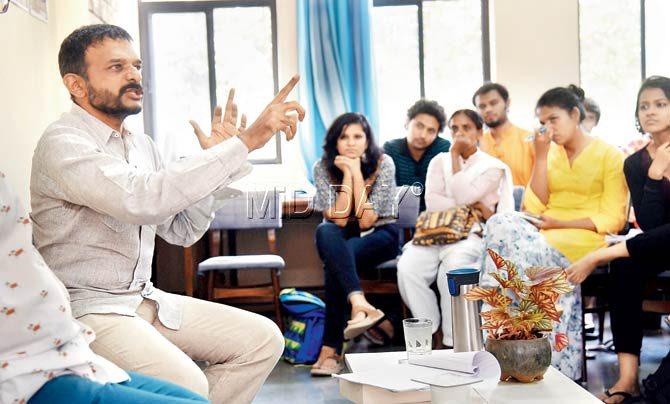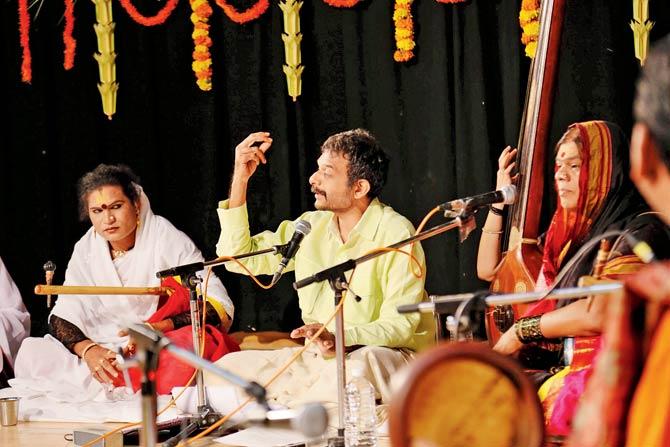Carnatic vocalist TM Krishna’s concerts and conversations in Mumbai demonstrate the diversity of spaces and audiences that can be factored into art music programming


TM Krishna on Friday chatted with media students at Sophia college for two hours. Pic/Nimesh Dave
Siddamma G Algonda, 50, a transgender singer (Jogappa) based in Karnataka’s Managoli village (Bijapur district) is excited about his evening concert rendition at Mumbai’s Sitara Studio today. It will be his first visit to the city and the second instance of sharing the stage with Carnatic music vocalist-public intellectual TM Krishna, famously known as TMK, who has been in Mumbai since December 2 for “concerts and conversations on music, art and society” in four distinct venues. Sitara is the last Mumbai stop before Krishna flies off to Anaikatti as Project Day Chief Guest at a school for underprivileged children, and Siddappa, along with four fellow Jogappas (three from neighboring Belgaum district, and one from his own Bijapur) will see if there can be more to their lives than subsisting on alms asked in the praise of Goddess Yellamma.
ADVERTISEMENT

Sagar Bhaskar (the artiste in white saree from Belgaum), TM Krishna (centre), Siddamma (the senior artiste from Bijapur) seen at the first Jogappa concert at the beginning of 2016 in Bangalore
 “We have been singing in a routine way, while going door-to-door for our jogwas, but not for an invited urban audience; never for a ticketed show of two hours, like the one in Mumbai. So we are happy that our everyday Kannada and Marathi bhajans sung in praise of Lord Ganesh, Shiva, Vitthal and Renukamata have become so central to a musical evening,” explains Siddamma who is elated that TMK not just sings with them in his idiom, offers a commentary on their lives in English and Hindi, and most importantly, rehearses with them before the show. The other Jogappas are also happy about the continued engagement with him and also the Bangalore-based Solidarity Foundation which positioned them in the concert setting at the beginning of 2016. Satish Kerba Pasare adds: “I have lived most of my 30 years in the beedi-making town of Nipani. Ever since I took on the female form in a saree and the name Rakhi five years ago, I have always sung in temples. That’s why being on stage with a singer who considers our folk songs equal to his art music means a lot to us. It brings alive the song we sing with him... karbhari anand zala manala...” Pasare hopes meeting newer people in Mumbai may open new doors for a matriculate like him.
“We have been singing in a routine way, while going door-to-door for our jogwas, but not for an invited urban audience; never for a ticketed show of two hours, like the one in Mumbai. So we are happy that our everyday Kannada and Marathi bhajans sung in praise of Lord Ganesh, Shiva, Vitthal and Renukamata have become so central to a musical evening,” explains Siddamma who is elated that TMK not just sings with them in his idiom, offers a commentary on their lives in English and Hindi, and most importantly, rehearses with them before the show. The other Jogappas are also happy about the continued engagement with him and also the Bangalore-based Solidarity Foundation which positioned them in the concert setting at the beginning of 2016. Satish Kerba Pasare adds: “I have lived most of my 30 years in the beedi-making town of Nipani. Ever since I took on the female form in a saree and the name Rakhi five years ago, I have always sung in temples. That’s why being on stage with a singer who considers our folk songs equal to his art music means a lot to us. It brings alive the song we sing with him... karbhari anand zala manala...” Pasare hopes meeting newer people in Mumbai may open new doors for a matriculate like him.
TMK’s collaboration with members of a sexual minority is a coming together of not just two distinct styles of music, but also two distinct types of performers on stage. It adds a new layer to Mumbai’s cultural programming because the concert is located in an auditorium in a Lower Parel slum. Sitara Studio owner Nikhil Hemrajani calls it “music which goes beyond concerts, which takes the narrative forward and encourages new partnerships.”
Among the new equations that TMK has formed — a vibrant one was seen at Sophia college where media students, with no particular grounding in Carnatic or Hindustani music, chatted with the multi-faceted, self-critical and ever-experimenting TM Krishna (40) for two hours. For an author (A Southern Music — 2013) who received the Ramon Magsaysay award this year and for someone known to speak well on art’s power to heal social divisions, such an interaction was natural. But, it must be noted that it is an uncommon gesture in the world of classical music — whether in the south or the north of India — where an open dialogue with the uninitiated is not the norm. In fact, that is one of the reasons why Dr Sunitha Chitrapu, head of Sophia’s Social Communications Media department, finds it worth replicating in Mumbai colleges: “Most young people have a vague idea of any classical form. They feel it is something cerebral, something their parents did… That’s precisely why talking about it is important, especially by an artiste who brings a wealth of social understanding to his practice.”
The Karnatic Modern concert is also an attempt to curate in a way that is sensitive to and feeds off the energies of diverse art spheres. It tries to question the demarcation of the city into cultural zones. For instance, the idea of a Carnatic concert in a south Indian neighborhood of Sion or Chembur subscribes to the accepted idea of the city as a cluster of earmarked monolithic zones in which hardcore Hindustani music rasikas will balk at the prospect of going to the Shanmukhananda Hall to hear Carnatic music and vice versa. The credit for locating TMK’s Carnatic music concert (December 3) at the Veer Savarkar Hall in Dadar — a supposed mainstream seat of Hindustani classical music tradition — goes to First Edition Arts’ founder Devina Dutt, who has worked towards materialising the Karnatic Modern itinerary for over seven months. Dutt feels that since TMK is an artiste of many parts and a symbol of renewal in Carnatic music, he was the most suited to take Mumbai’s art lovers across all social and ethnic divides.
She, and the artiste himself, was not interested in a three-day blitzkrieg, but an extended conversation between art practitioners and audiences across genres. In that context, TMK’s Manodharma (the Carnatic term for improvisation) December 2 lecture-demonstration at the G5A Foundation for Contemporary Culture, an intimate space in a retrofitted Mahalaxmi mill, was also a long overdue cultural dialogue between Carnatic and Hindustani music systems in the presence of senior Hindustani gurus (like Pandit Arun Kashalkar and Ashwini Bhide Deshpande) and students. The face-to-face encounters between practitioners of the two forms of classical music have been extremely rare. “The general belief in the Hindustani world is that Carnatic music tends to be low on creativity and improvisation. But this raises fundamental questions of the very definition of creativity and the aesthetics and musical philosophy of each system of music. This was thus an opportunity to understand how Carnatic music is made and what its aesthetic values are,” says Dutt.
At the root of Karnatic Modern is an attempt to generate “an interest in the other” and discourage the rise of insularity which is, sadly, one of the characteristic features of an otherwise open and egalitarian Mumbai. In fact, insularity is common to many performing art forms (theatre and dance included) practiced in the city. The First Edition Arts’ publicity videos on Karnatic Modern therefore involve voices from a wider arts community which underscore the need for healthy exchanges between diverse arts. The videos featuring theatre director Sunil Shanbag and author Jerry Pinto show TMK’s connect with like-minded artistes who question hierarchies and feudal power play in the arts.
Karnatic Modern is an important slot in Mumbai’s cultural calendar for another reason. TMK, though a Chennai-based artist, appreciates Mumbai’s performance culture in its totality. And this is not just because he has performed in Mumbai over the years, but because he is sensitive and alive to dissimilar performance traditions and power structures governing the arts in contemporary India. In his own words: “The Mumbai texture allows for greater interaction between people of different economic and social backgrounds. Yet, like any city in this country, Mumbai simmers with tensions of casteism, patriarchy and regional chauvinism. Therefore unless these issues are directly addressed, things do not change.”
One concert tour cannot make an overnight change in a city’s culture. But one vocalist can certainly trigger critical thinking and introspection on matters musical and otherwise.
Sumedha Raikar-Mhatre is a culture columnist in search of the sub-text. You can reach her at sumedha.raikar@gmail.com
 Subscribe today by clicking the link and stay updated with the latest news!" Click here!
Subscribe today by clicking the link and stay updated with the latest news!" Click here!







